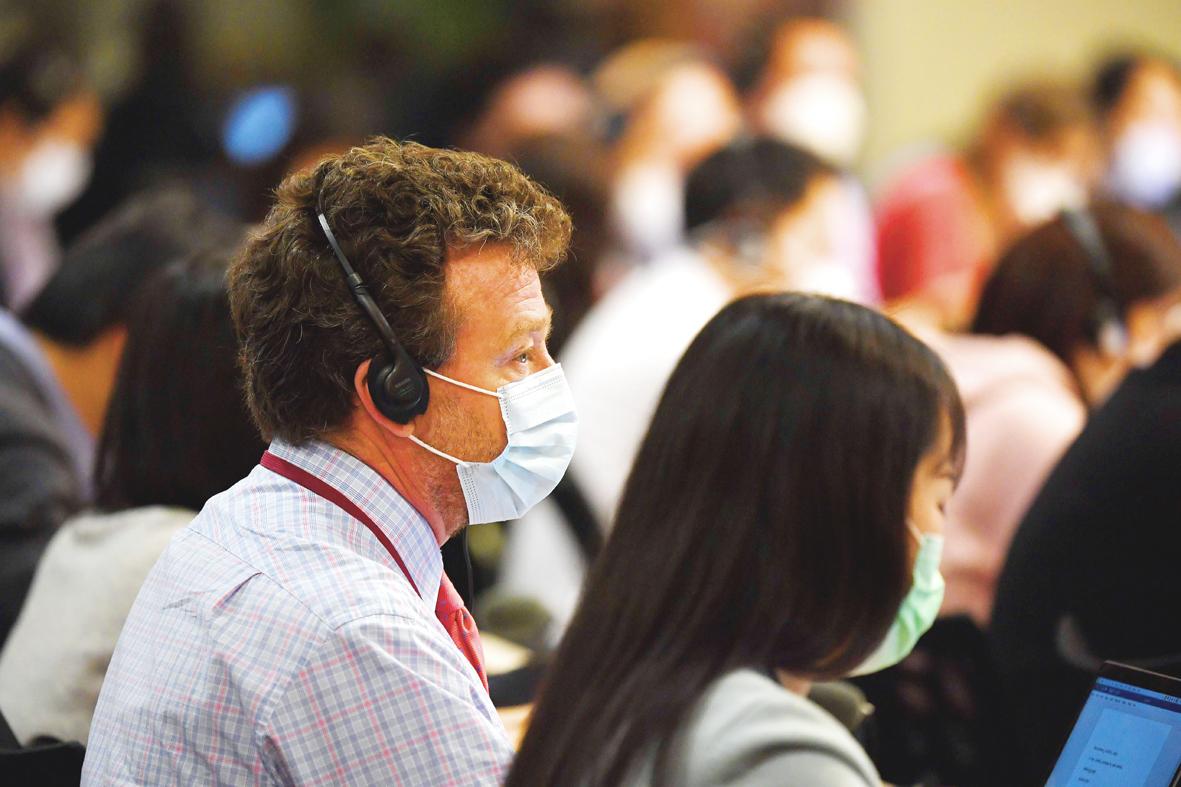The Chinese Ministry of Foreign Affairs yesterday announced that China would revoke the media credentials of all American journalists at three major US media organizations in response to new US restrictions on Chinese state-controlled media.
US citizens working for the New York Times, the Wall Street Journal and the Washington Post with credentials expiring before the end of this year must surrender their press cards within 10 days, the ministry said.
It is the latest in a series of tit-for-tat actions by the two governments as US Donald Trump’s administration takes a more confrontational stance than his predecessors in dealing with China. The two countries remain enmeshed in a trade dispute and have traded angry words over the COVID-19 pandemic.

Photo: AFP
The move comes after the Trump administration designated five Chinese media outlets as foreign missions and restricted the number of Chinese who could work for them in a de facto expulsion of about one-third of their Chinese staff.
Beijing described its steps as “necessary and reciprocal countermeasures that China is compelled to take in response to the unreasonable oppression the Chinese media organizations experience in the US.”
The American journalists will likely have to leave China, because their visas are tied to their press credentials. They would not be allowed to work in China, Hong Kong or Macau, a ministry statement said.
US Secretary of State Mike Pompeo disputed the comparison between the US and Chinese actions.
“The individuals that we identified a few weeks back were not media that were acting here freely,” he said. “They were part of Chinese propaganda outlets. We’ve identified these as foreign missions under American law.”
Editors of all three organizations condemned the action.
“The Chinese government’s decision is particularly regrettable because it comes in the midst of an unprecedented global crisis, when clear and reliable information about the international response to COVID-19 is essential,” Washington Post executive editor Marty Baron said. “Severely limiting the flow of that information, which China now seeks to do, only aggravates the situation.”
In its announcement yesterday, China said that five US media outlets — the three newspapers, Voice of America and Time magazine — would be required to declare information in writing about their staff, finances, operations and real estate in China.
China would take reciprocal measures against American journalists generally on visas, administrative review and reporting, it said, without further detail.

SECURITY: As China is ‘reshaping’ Hong Kong’s population, Taiwan must raise the eligibility threshold for applications from Hong Kongers, Chiu Chui-cheng said When Hong Kong and Macau citizens apply for residency in Taiwan, it would be under a new category that includes a “national security observation period,” Mainland Affairs Council (MAC) Minister Chiu Chui-cheng (邱垂正) said yesterday. President William Lai (賴清德) on March 13 announced 17 strategies to counter China’s aggression toward Taiwan, including incorporating national security considerations into the review process for residency applications from Hong Kong and Macau citizens. The situation in Hong Kong is constantly changing, Chiu said to media yesterday on the sidelines of the Taipei Technology Run hosted by the Taipei Neihu Technology Park Development Association. With

CARROT AND STICK: While unrelenting in its military threats, China attracted nearly 40,000 Taiwanese to over 400 business events last year Nearly 40,000 Taiwanese last year joined industry events in China, such as conferences and trade fairs, supported by the Chinese government, a study showed yesterday, as Beijing ramps up a charm offensive toward Taipei alongside military pressure. China has long taken a carrot-and-stick approach to Taiwan, threatening it with the prospect of military action while reaching out to those it believes are amenable to Beijing’s point of view. Taiwanese security officials are wary of what they see as Beijing’s influence campaigns to sway public opinion after Taipei and Beijing gradually resumed travel links halted by the COVID-19 pandemic, but the scale of

A US Marine Corps regiment equipped with Naval Strike Missiles (NSM) is set to participate in the upcoming Balikatan 25 exercise in the Luzon Strait, marking the system’s first-ever deployment in the Philippines. US and Philippine officials have separately confirmed that the Navy Marine Expeditionary Ship Interdiction System (NMESIS) — the mobile launch platform for the Naval Strike Missile — would take part in the joint exercise. The missiles are being deployed to “a strategic first island chain chokepoint” in the waters between Taiwan proper and the Philippines, US-based Naval News reported. “The Luzon Strait and Bashi Channel represent a critical access

Pope Francis is be laid to rest on Saturday after lying in state for three days in St Peter’s Basilica, where the faithful are expected to flock to pay their respects to history’s first Latin American pontiff. The cardinals met yesterday in the Vatican’s synod hall to chart the next steps before a conclave begins to choose Francis’ successor, as condolences poured in from around the world. According to current norms, the conclave must begin between May 5 and 10. The cardinals set the funeral for Saturday at 10am in St Peter’s Square, to be celebrated by the dean of the College